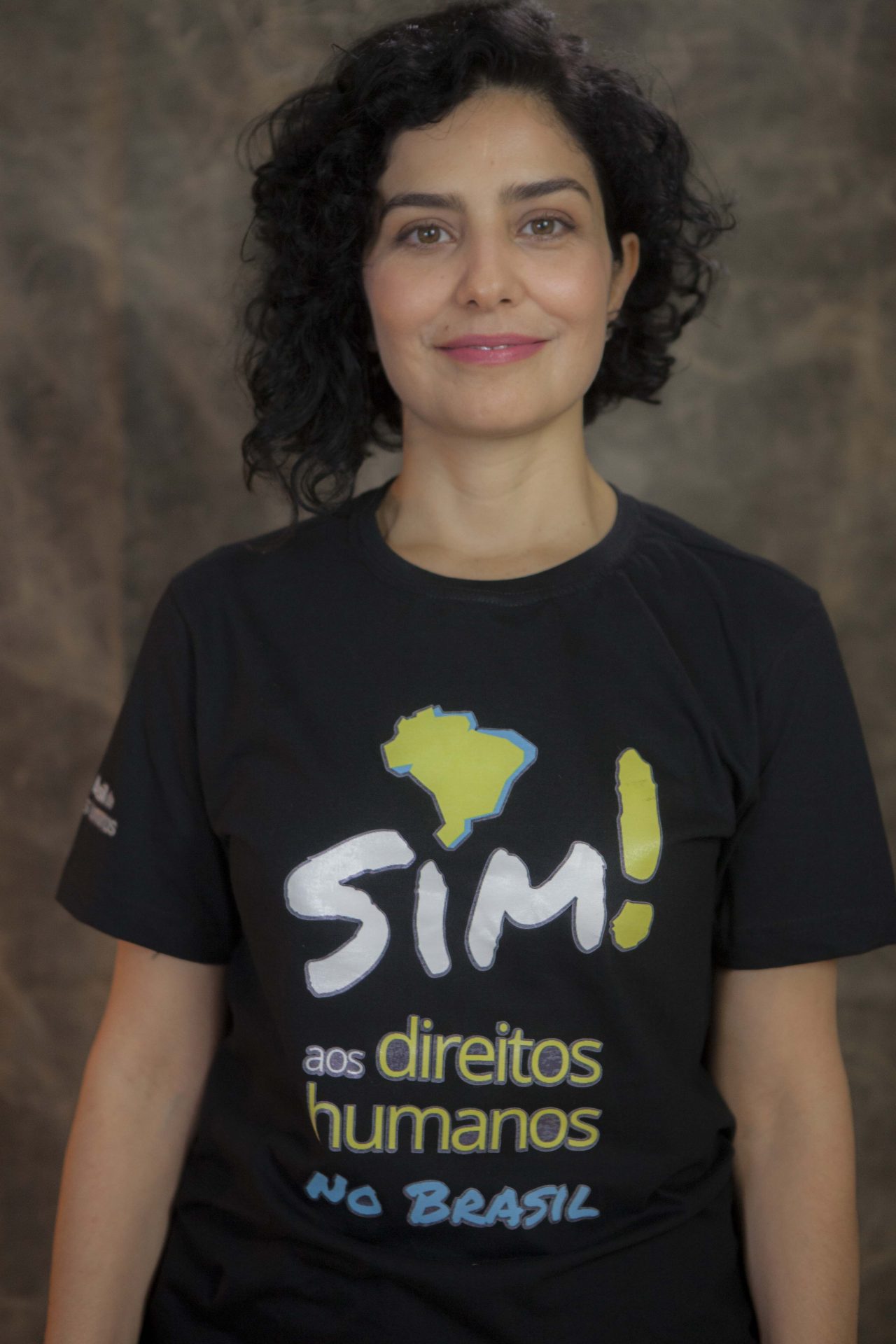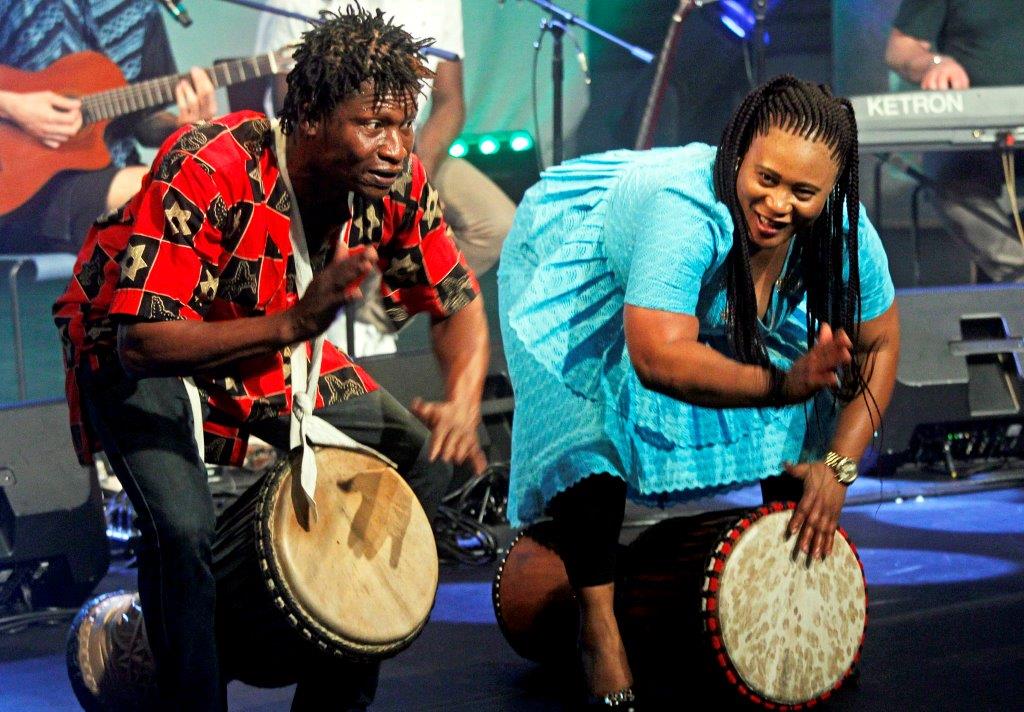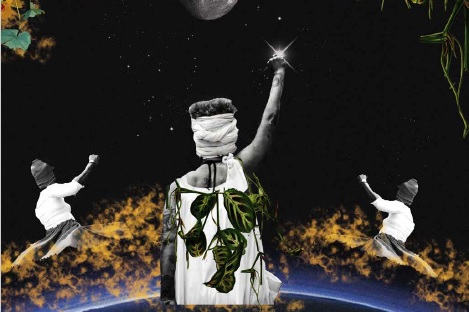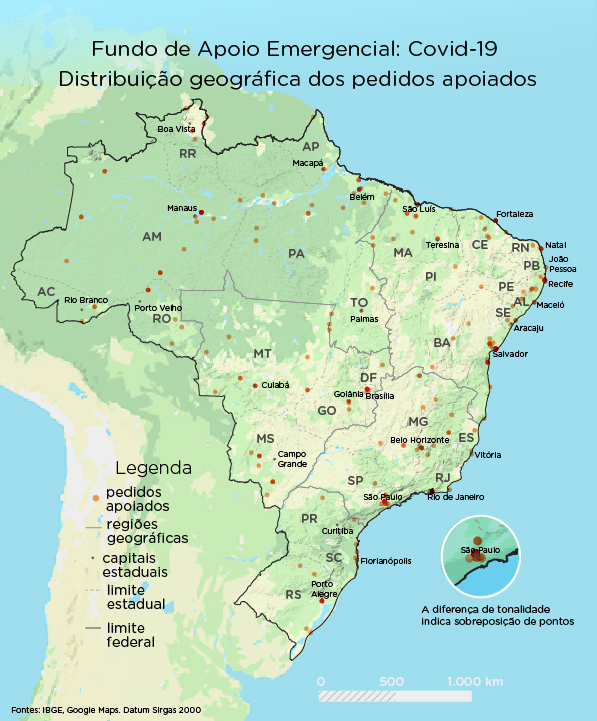Between the last week of July and the first week of August, Brazil Human Rights Fund’s team went to the country’s northern region to make monitoring visits. This process is an essential part of Brazil Fund’s work with the groups granted in the calls for proposals. Strengthening the organized civil society involves finding leaders, knowing the work up close, and listening actively to the reality of an organization.
In most of these follow-ups, the foundation’s team goes to the territories of the supported projects to offer technical support and help strengthen the group’s performance. However, this time two events hosted conversations about the development of the projects: the 10th Fospa – Pan-Amazonian Social Forum in Belém (PA) and the 13th General Assembly of COIAB – Coordination of Indigenous Organizations in the Brazilian Amazon, in Oiapoque (AP).
The organizations that met with program officer Juliane Yamakawa and communication officer Airan Albino develop projects through the Emergency Support for indigenous organizations in Legal Amazon – SOS Amazônia. This emergency support is an attempt to respond quickly to requests set out to tackle threats to indigenous peoples in defense of their rights and territories.
Belem. The meeting with the Association of Indigenous Women of the Upper Rio Negro – AMARN took place during Fospa at the Federal University of Pará. The event brought together human rights defenders who promote actions for the Good Living of the Amazon Basin.
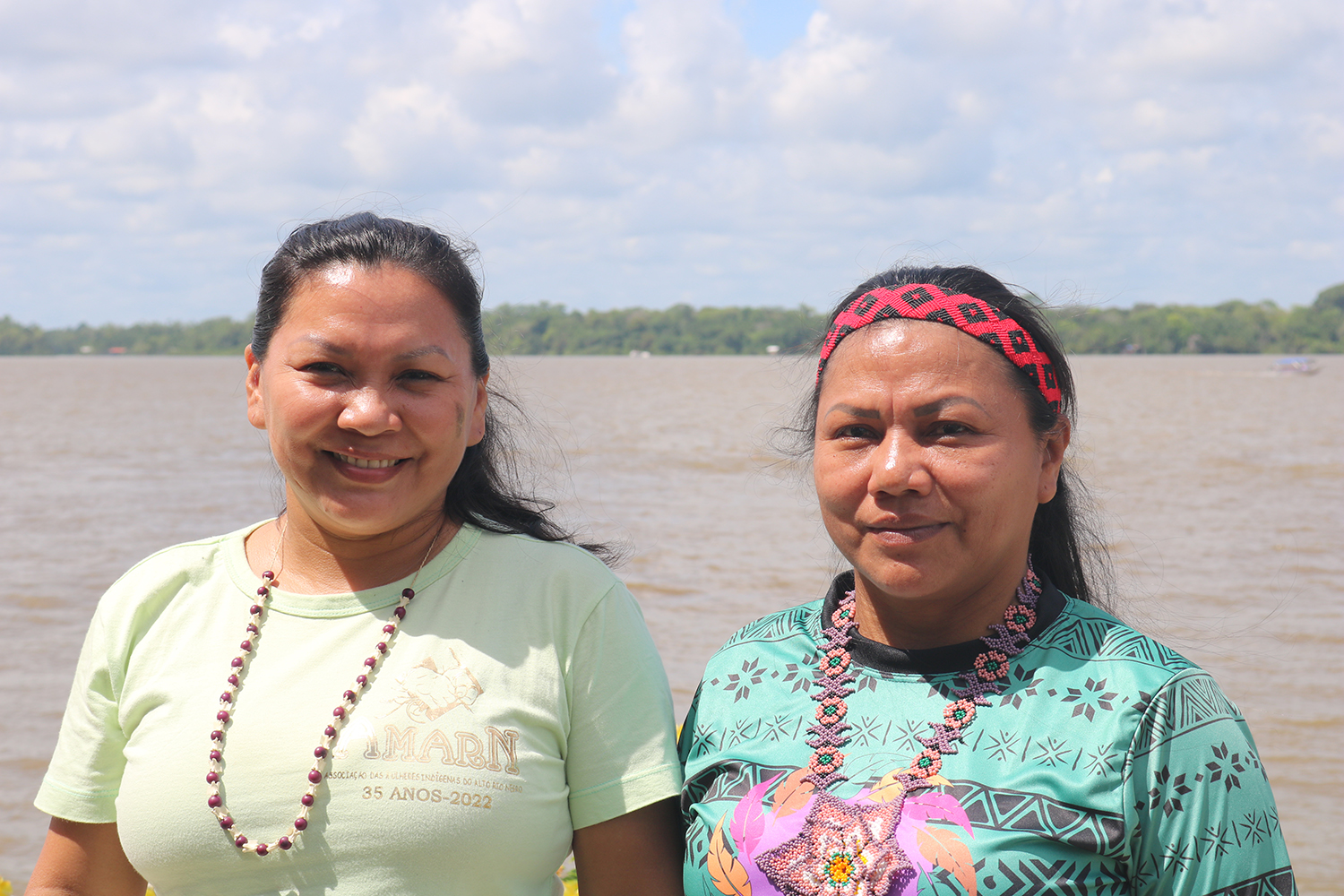
Isabel Dessena and Clarice Arbela. Credits: Airan Albino
Numiã Kurá in the Tukano language means “Group of Women”; this is one of the ways the Association of Women of the Upper Rio Negro identifies. They are women from different peoples near Rio Negro – but went to Manaus in search of work and ended up in a vulnerable situation. Within the project, AMARN develops actions that denounce rights violations of indigenous peoples in the State of Amazonas and six other organizations, also part of the commission of the Amazonian Front for Mobilization in Defense of Indigenous Rights (FAMDDI).
Among AMRN’s acts of denunciation within the FAMDDI is the Act for the Life of the Yanomami and the participation in the Amazonian Indigenous Movement’s Collective Reclaim of Rights, which discussed the achievements and challenges of the movement in March this year. “The project helped us defend the rights of indigenous populations against violence in general, but especially of women. We want to reach all the women from upper Rio Negro, Santa Isabel, Barcelos, the women in the cities, also facing violence; we want to expand beyond AMARN,” says Isabel Dessena, anthropologist and part of the AMARN
Within its 35 years of activity, Numiã Kurá also sees craftsmanship as a way of maintaining the identity of people in the association and strengthening their community’s diversity. “We need to be seen, even in the cities; I know that we have a history of erasure. The State builds a relationship of restriction and erasure, saying that the indigenous people in the city no longer have a relationship with their culture. On the contrary, we work with craftsmanship; all our work is with raw materials from our communities and relatives. Being in the city, we contribute a lot there”, says Clarice Arbela Tukano, general coordinator of AMARN.
Oiapoque. The COIAB Assembly happened in the first week of August, where the new executive coordination of the organization was defined, in addition to COIAB representatives in APIB (Articulation of the Indigenous Peoples of Brazil) and COICA (Coordinator of Indigenous Organizations of the Amazon Basin). The political meeting received representatives from 64 regions of indigenous territories divided into the states within the Brazilian Amazon – the entire northern region, in addition to Maranhão and Mato Grosso.
The territory chosen to host the assembly was Aldeia Manga, located in the Uaçá Indigenous Territory. The region also integrates two other territories: TI Juminã and Galibi, the latter home to Nana Kali’na Association. Brazil Fund’s support enabled inspection and protection initiatives in the Galibi Indigenous Territory, such as identification plaques, surveillance, and territorial monitoring to prevent possible invasions and robberies.
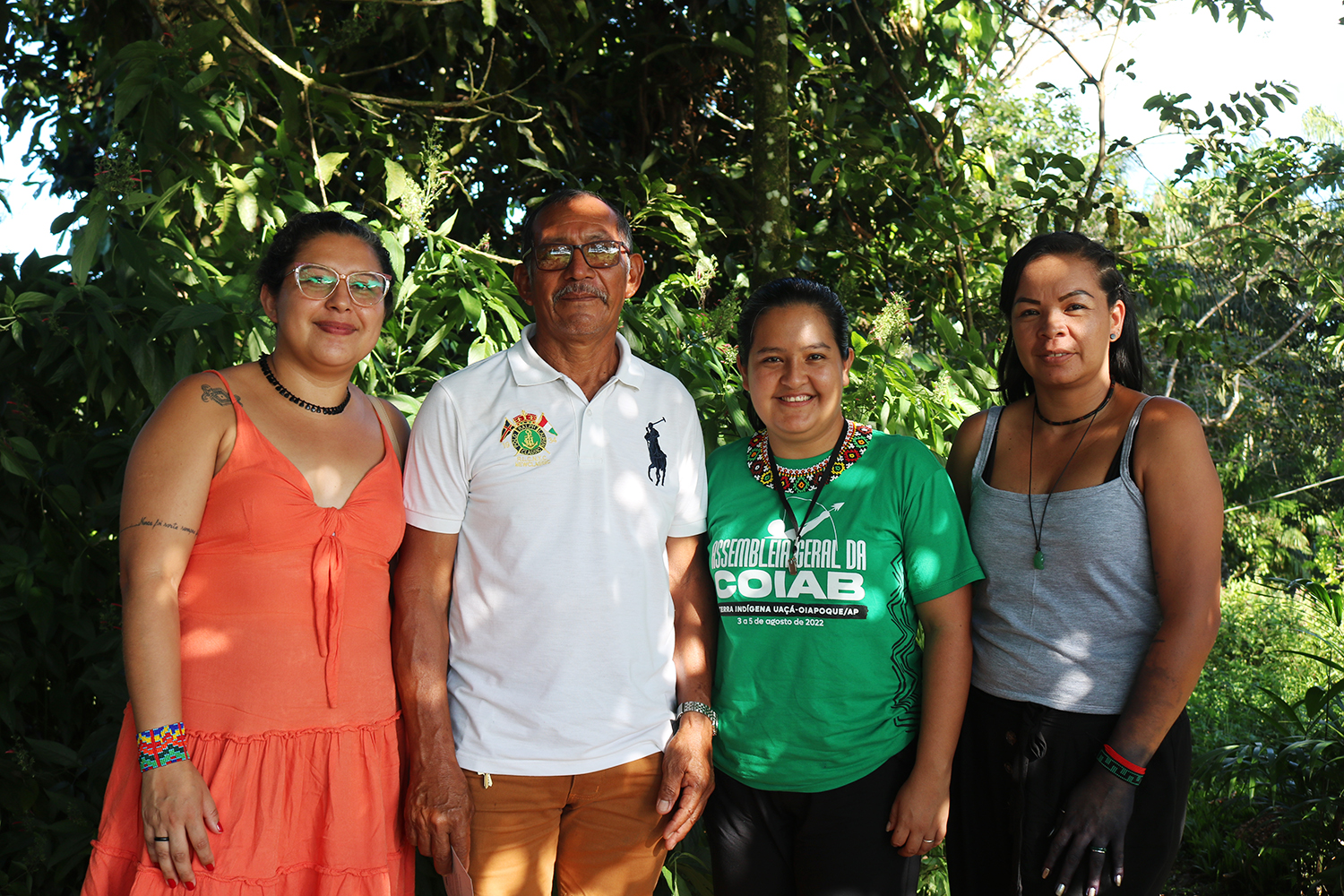
Renata Lod, Chief Miguel Jeanjacque, Kassia Lod, and Vice Chief Sônia Jeanjacque. Credits: Airan Albino
As it is an international area (border between Brazil and French Guiana), the Oiapoque River has an intense flow of people who are often involved in clandestine activities, such as illegal mining. In addition, the indigenous territories are located on the riverbanks and, therefore, suffer invasions in their lands, mercury contamination in the region, and theft of speedboats (canoes), among other risks.
The Nana Kali’na Association is led mainly by women, and the organization’s work in protecting the territory has become an example for other communities in Oiapoque. “We are the main leaders against mining here in the region. We are three indigenous territories, but we see ourselves as only one. So, we try to use this to our advantage and convey the importance of protecting the territory to others. We were the ones who started debating the mining issue, as well as confronting it. Eventually, we ended up becoming a reference in this struggle here”, says Kassia Lod, responsible for the Nana Kali’na initiative.
“What I want to highlight is the strengthening of leadership. How much this project is bringing learning to us as an organization. Our ability to administer, manage, and make things that are out of our reality happen. Not only we carried out an inspection in the territory, but it was also a recognition, a resumption of a history”, says Renata Lod from the association’s board of directors.
Another organization that spoke with the Brazil Fund team was the CIR – Indigenous Council of Roraima. The project supported by Brazil Fund carries out actions to increase the visibility of the threats and the concrete violations of indigenous rights in the State. Roraima’s delegation participated significantly during the assembly in Aldeia Manga, managing to elect representatives of their State for the executive coordination of COIAB. CIR’s strength comes from the size of the organization and the challenges the council faces in its work.
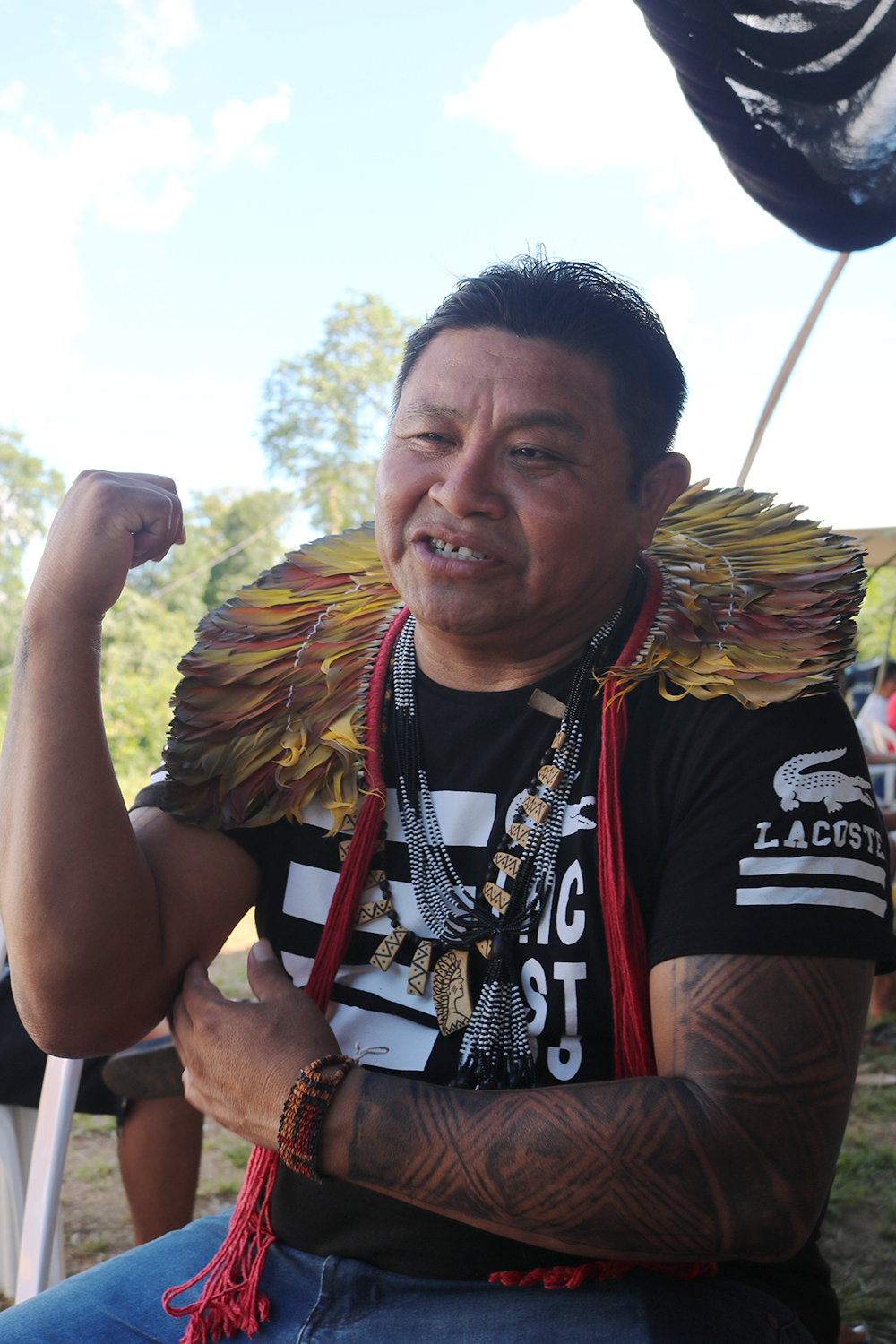
Edinho Macuxi. Credits: Airan Albino
The State of Roraima has 261 indigenous communities; there are 55 thousand people in 32 Indigenous Territories, equivalent to 10 million hectares. “Today, we have an intelligence network, a communication group, a territorial protection group. We have brigades and indigenous rights operators who are not lawyers but know Law Projects. We also have trained territorial managers, agricultural technicians, environmental management, anthropologists, lawyers, a real team to show the world who we really are,” explains Edinho Macuxi, General Coordinator of the CIR.
“We are also working with the PGTA (Territorial and Environmental Management Plan) for Indigenous Territory, which helps us zoning in order to work on the economic, political, social, and cultural organization of our community. This a 50, 100-year projection because we don’t want to tell our children the story of a river through a sketch – we want to show them the actual river. So, these are the things that make up our flag, one that we will not give up. It may cost your life, but it’s a fight that continues. If ten die, 1.000 will be born; if 1.000 die, 10.000 will be born, we will continue”, he concludes.






















